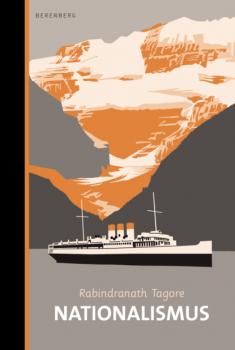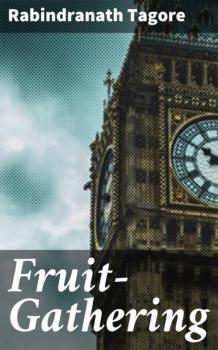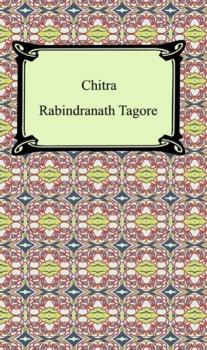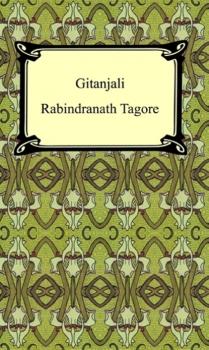ТОП просматриваемых книг сайта:















Rabindranath Tagore
Список книг автора Rabindranath TagoreАннотация
"The Hungry Stones, and Other Stories" by Rabindranath Tagore. Published by Good Press. Good Press publishes a wide range of titles that encompasses every genre. From well-known classics & literary fiction and non-fiction to forgotten−or yet undiscovered gems−of world literature, we issue the books that need to be read. Each Good Press edition has been meticulously edited and formatted to boost readability for all e-readers and devices. Our goal is to produce eBooks that are user-friendly and accessible to everyone in a high-quality digital format.
Аннотация
"Sadhana : the realisation of life" by Rabindranath Tagore. Published by Good Press. Good Press publishes a wide range of titles that encompasses every genre. From well-known classics & literary fiction and non-fiction to forgotten−or yet undiscovered gems−of world literature, we issue the books that need to be read. Each Good Press edition has been meticulously edited and formatted to boost readability for all e-readers and devices. Our goal is to produce eBooks that are user-friendly and accessible to everyone in a high-quality digital format.
Аннотация
"The Post Office" by Rabindranath Tagore (translated by Devabrata Mukherjee). Published by Good Press. Good Press publishes a wide range of titles that encompasses every genre. From well-known classics & literary fiction and non-fiction to forgotten−or yet undiscovered gems−of world literature, we issue the books that need to be read. Each Good Press edition has been meticulously edited and formatted to boost readability for all e-readers and devices. Our goal is to produce eBooks that are user-friendly and accessible to everyone in a high-quality digital format.
Аннотация
"Die Nation ist der organisierte Eigennutz eines ganzen Volkes, jener Zug an ihm, der am wenigsten menschlich ist."
Rabindranath Tagores Reden über den Nationalismus sind hundert Jahre alt, aber fast taufrisch. Mit ihnen protestierte Indiens Nobelpreisträger gegen «den Westen» und seine Neigung, dem Rest der Welt das eigene Gesellschafts- und Wirtschaftsmodell als alternativlos zu verkaufen. Hier wird alles verhandelt: das eigensüchtige Konstrukt von hinter ihren Grenzen verschanzten Nationen, ihre Gier, ihr Rassismus gegenüber vermeintlich minderwertigen Völkern, denen man alles nehmen darf. Auch hundert Jahre später lesen sich diese Ansprachen als ein Manifest, mit dem Tagore den Seinen zurief: «Empört Euch!»
Rabindranath Tagores Reden über den Nationalismus sind hundert Jahre alt, aber fast taufrisch. Mit ihnen protestierte Indiens Nobelpreisträger gegen «den Westen» und seine Neigung, dem Rest der Welt das eigene Gesellschafts- und Wirtschaftsmodell als alternativlos zu verkaufen. Hier wird alles verhandelt: das eigensüchtige Konstrukt von hinter ihren Grenzen verschanzten Nationen, ihre Gier, ihr Rassismus gegenüber vermeintlich minderwertigen Völkern, denen man alles nehmen darf. Auch hundert Jahre später lesen sich diese Ansprachen als ein Manifest, mit dem Tagore den Seinen zurief: «Empört Euch!»
Аннотация
"Fruit-Gathering" by Rabindranath Tagore. Published by Good Press. Good Press publishes a wide range of titles that encompasses every genre. From well-known classics & literary fiction and non-fiction to forgotten−or yet undiscovered gems−of world literature, we issue the books that need to be read. Each Good Press edition has been meticulously edited and formatted to boost readability for all e-readers and devices. Our goal is to produce eBooks that are user-friendly and accessible to everyone in a high-quality digital format.
Аннотация
"The Spirit of Japan" by Rabindranath Tagore. Published by Good Press. Good Press publishes a wide range of titles that encompasses every genre. From well-known classics & literary fiction and non-fiction to forgotten−or yet undiscovered gems−of world literature, we issue the books that need to be read. Each Good Press edition has been meticulously edited and formatted to boost readability for all e-readers and devices. Our goal is to produce eBooks that are user-friendly and accessible to everyone in a high-quality digital format.
Аннотация
"The Home and the World" by Rabindranath Tagore. Published by Good Press. Good Press publishes a wide range of titles that encompasses every genre. From well-known classics & literary fiction and non-fiction to forgotten−or yet undiscovered gems−of world literature, we issue the books that need to be read. Each Good Press edition has been meticulously edited and formatted to boost readability for all e-readers and devices. Our goal is to produce eBooks that are user-friendly and accessible to everyone in a high-quality digital format.
Аннотация
In 1913, Rabindranath Tagore became the first non-European to win the Nobel Prize in Literature, and he remains one of the most important voices of Bengali culture to this day.These short stories, written mostly in the 1890s, vividly portray Bengali life and culture. Tagore’s treatment of caste culture, bureaucracy and poverty paint a vivid portrait of nineteenth-century India, and all are interwoven with Tagore’s perceptive eye for detail, strong sense of humanity and deep affinity for the natural world.Tagore’s stories continue to rise above geographic and cultural boundaries to capture the imaginations of readers around the world.
Аннотация
"This lyrical drama… is based on the following story from the Mahabharata. In the course of his wanderings, in fulfilment of a vow of penance, Arjuna came to Manipur. There he saw Chitr?ngad?, the beautiful daughter of Chitrav?hana, the king of the country. Smitten with her charms, he asked the king for the hand of his daughter in marriage. Chitrav?hana asked him who he was, and learning that he was Arjuna the Pandara, told him that Prabhanjana, one of his ancestors in the kingly line of Manipur, had long been childless. In order to obtain an heir, he performed severe penances. Pleased with these austerities, the god Shiva gave him this boon, that he and his successors should each have one child. It so happened that the promised child had invariably been a son. He, Chitrav?hana, was the first to have only a daughter Chitr?ngad? to perpetuate the race. He had, therefore, always treated her as a son and had made her his heir. Continuing, the king said: «The one son that will be born to her must be the perpetuator of my race. That son will be the price that I shall demand for this marriage. You can take her, if you like, on this condition.» Arjuna promised and took Chitr?ngad? to wife, and lived in her father's capital for three years. When a son was born to them, he embraced her with affection, and taking leave of her and her father, set out again on his travels."—From the Preface.
Аннотация
"Gitanjali", or Song Offerings, is a collection of poems translated by the author, Rabindranath Tagore, from the original Bengali. This collection won the Nobel prize for Tagore in 1913. This volume includes the original introduction by William Butler Yeats that accompanied the 1911 English language version. «Gitanjali» is a collection of over 100 inspirational poems by India's greatest poet.










